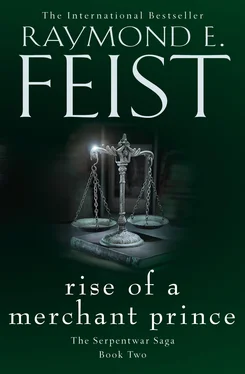1 ...6 7 8 10 11 12 ...26 So those who survived and became successful had few peers with whom to share their pride of accomplishment, few fellows with whom to boast of their good fortune and perspicacity. A few, like a merchant Roo had met named Helmut Grindle, kept their appearance modest, as if to call attention to themselves might bring ruin. But others chose to shout their success to the world by building huge town houses, rivaling those owned by the nobility, throughout the city. And over the years the nature of the Merchants’ Quarter had changed.
As more and more rich merchants purchased property in the area, the cost of land rose so high that now few businesses in the Merchants’ Quarter were owned by those who lived there; the price of housing was too dear. There were a few modest storefront enterprises, established by the fathers or grandfathers of those tending them now, that continued to provide conventional goods and services to those in the area – a bakery on one street, a cobbler on another – but they were quickly being replaced by shops specializing in luxurious items for these very wealthy merchants: jewelers, tailors of the finest clothing, and traders in rare goods. And those who lived in the Merchants’ Quarter were now almost exclusively these very wealthy businessmen, those with far-flung financial empires elsewhere in the province or in distant cities. In time the last of the modest merchants would sell their property, as the offers to buy became too good to refuse, and relocate to more distant quarters in the foulburg, that expanding portion of the city beyond the old wall.
Barret’s Coffee House stood at the corner of a street now known as Arutha’s Way, in honor of the late Prince of Krondor, father to the King – but still called by most locals Sandy Beach Walk – and Miller’s Road, a route that had once led from a mill no longer extant to a farmer’s gate long torn down. Barret’s was a tall building, three stories, with two open doors at the corner, one on each street. Standing in each door was a waiter: a man with a white tunic, black trousers, black boots, and a blue-and-white-striped apron.
The three other street corners were occupied by a tavern, a ship’s broker, and, diagonally across the street from Barret’s, an abandoned home. It had once been splendid, perhaps one of the finest in Krondor, but misfortune had cost its owner dearly from all appearances. It had been neglected long before it was abandoned, and its past glory was now faded by peeling paint, boarded-up windows, missing tiles from the roof, and dirt everywhere.
Roo glanced at that building. ‘Maybe someday I’ll buy that house and fix it up.’
Erik smiled. ‘I don’t doubt it, Roo.’
Roo and Erik walked past the waiter standing at the door on Miller’s Road, and entered. The two outside doors opened on a simple receiving area, offering several well-upholstered chairs, but otherwise closed off from the main floor of the coffee house by a wooden railing. There was one opening in the railing blocked by a man attired in a manner similar to the two waiters at the door. The main difference was that his apron was black.
A tall man, he looked eye to eye at Erik, then down at Roo as he said, ‘Yes?’
Erik said, ‘We’ve come to see Sebastian Lender.’
The man nodded. ‘Follow me, please.’ He turned and walked onto the main floor of the coffee house.
Roo and Erik followed and were led through a large area of small tables, several occupied by men drinking coffee, while waiters hurried from table to table. To the left as they reached the center of the room a broad flight of stairs led up to a balcony rather than a true second floor, leaving the center of the room open to the high vaulted ceiling. Looking up, Roo saw there was no third floor, but rather a double set of high windows above the second-floor balcony. Barret’s was a very open, well-lit building as a result. They reached another waist-high railing, which cut off the rear third of the room, and there the waiter said, ‘Please wait here.’
The waiter moved a small section of the rail that was on hinges, and stepped through and toward a table at the far side of the house. Roo motioned upward and Erik’s eyes went to where he pointed.
Above them, on the second-floor landing, men sat at tables. Roo said, ‘The brokers.’
‘How do you know?’
‘I’ve heard a thing or two,’ said Roo.
Erik laughed and shook his head. Most likely he had heard it from Helmut Grindle, the trader they had traveled with for a while when coming to Krondor. Roo and Grindle had spoken of many things commercial, and while Erik had found some of the conversation diverting, as often as not it put him to sleep.
A moment later, a dignified-looking man wearing an unadorned but expensive tunic with an overvest and cravat approached. He studied the two young men before him for a moment, then said, ‘My word! Young von Darkmoor and Mr Avery, if I’m not mistaken.’
Roo nodded as Erik said, ‘Yes, Mr Lender. We gained our pardon.’
‘Most unusual,’ said Lender. He motioned for the waiter to open the railing for him to step through. ‘Only members are permitted behind this second railing.’ He indicated with a wave of his hand that Roo and Erik should sit at an empty table a few feet away.
He motioned for the waiter and said, ‘Three coffees.’ Looking at Roo and Erik, he asked, ‘Have you broken fast today?’ When they answered in the negative, he said to the waiter, ‘Some rolls, jams and honey, and a platter of cheese and sausage.’
As the waiter hurried off, Lender said, ‘As you are pardoned, you obviously do not need my services as a solicitor, so perhaps you need them as a litigator?’
Erik said, ‘Not really. I came to pay you your fee.’
Lender began to object, but Erik said, ‘I know you refused to take gold before, but despite your having lost the pleading, we are here and alive, so I think you’re entitled to your fee.’ He produced his money pouch and put it upon the table. It clinked with the heavy sound of gold coins.
Lender said, ‘You’ve prospered, young gentlemen.’
‘It’s a payment for services from the Prince,’ said Roo.
Shrugging, Lender opened the purse, counted out fifteen golden sovereigns, then closed the purse, pushing it back toward Erik. He pocketed the coins.
‘Is that enough?’ asked Erik.
‘Had I won, I would have charged you fifty,’ said Lender as the coffee arrived.
Roo had never cared for coffee, so he sipped at it, expecting to put aside the cup and ignore it. But to his surprise, instead of the bitter brew he had tasted before, this was a rich complex taste. ‘This is good!’ he blurted.
Erik laughed and tried his, then said, ‘It is.’
‘Keshian,’ said Lender. ‘Far superior to what is grown in the Kingdom. More flavor, less bitterness.’ He waved his hand around the room. ‘Barret’s is the first establishment in Krondor to specialize exclusively in fine coffees, and as a sign of his wisdom, the founder placed his first shop here in the heart of the Merchants’ Quarter, rather than trying to sell to the nobility.’
Roo instantly came alert; stories of success appealed to him. ‘Why is that?’ he asked.
‘Because the nobility are difficult to approach, expect extreme discounts, and rarely pay in a timely fashion.’
Roo laughed. ‘I’ve heard that from the wine merchants at home.’
Lender continued. ‘Mr Barret knew that the local businessmen often needed a place away from their homes or offices where they could discuss business over a meal, without the distractions of an inn’s taproom.’
Erik again nodded, having spent a fair part of his life in the taproom of the inn where he had worked as a child.
‘So was born Barret’s Coffee House, which prospered from the first week it was opened. Originally a more modest enterprise, it has existed for nearly seventy-five years, in this location for close to sixty.’
Читать дальше












